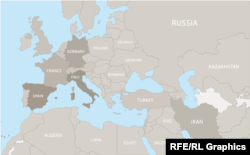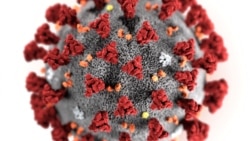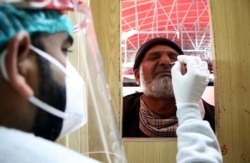The global death toll has surpassed 54,000 with over 1 million infections confirmed, causing mass disruptions as governments continue to try to slow the spread of the new respiratory illness.
Here's a roundup of developments in RFE/RL's broadcast countries.
Iran
President Hassan Rohani says U.S. sanctions have not hampered Iran's ability to fight the Middle East's worst outbreak of the coronavirus.
"We did not face a problem due to cohesion, good management, skilled and professional medical staff, and all of these came together," Rohani was quoted as saying during a cabinet meeting on April 2.
He also said that according to the country's Central Bank governor, "Iran has no problem in providing foreign currency until the end of the [Iranian] year," in March.
U.S. sanctions have cut off oil revenue and devastated the Iranian economy, causing the national currency, the rial, to fall in value.
"We have a good reserve of essential commodities for the next months and agriculture and trade ministers have given very promising reports for the situation during the coming months," Rohani said.
His comments come amid increased calls by Iranian officials, as well as a number of countries, the United Nations, and several U.S. lawmakers for the United States to ease sanctions, which some say have made it difficult for Tehran to contain the outbreak that has officially killed nearly 3,300 Iranians, including some 50 health-care workers and several politicians.
U.S. State Department spokeswoman Morgan Ortagus said on Twitter that Rohani's comments were a confirmation of Washington's stand that U.S.-led economic sanctions do not hamper Iran as it battles the coronavirus pandemic.
"We have repeatedly said that U.S. sanctions do not impede the Iranian regime's response to the COVID-19 crisis," Ortagus tweeted.
Live Map: The Spread Of The Coronavirus
Meanwhile, former U.S. Vice President and Democratic Party presidential contender Joe Biden on April 2 joined those calling for an easing of U.S. sanctions reimposed in 2018 after U.S. Donald Trump withdrew the United States from the 2015 nuclear deal aimed at curbing Iran's nuclear program.
"In times of global crisis, America should lead," Biden said in a statement released on April 2.
"We should be the first to offer help to people who are hurting or in danger. That's who we are. That's who we've always been," he added.
While noting that Tehran "failed to respond effectively to this crisis," Biden said that "it makes no sense, in a global health crisis, to compound that failure with cruelty by inhibiting access to needed humanitarian assistance."
Iranian authorities have been criticized for a slow initial response to the pandemic and a failure to quarantine the city of Qom, where the coronavirus outbreak erupted in February.
Recently, Tehran has enforced tougher measures, including a ban on intercity travel and strict social-distancing rules, to try to contain the pandemic.
Biden said the United States should take a number of steps, including issuing licenses to pharmaceutical and medical-device companies and creating a dedicated channel for international banks to support Iran in its fight against COVID-19.
Trump has previously offered Iran humanitarian assistance.
Asked on April 2 whether he would consider easing sanctions on Iran amid the coronavirus outbreak, Trump told reporters that Tehran had not made a formal request.
"They haven't asked us to do that," he said, adding that "If they want to meet, we'd love to do that."
In his statement, Biden said the Trump administration's offer of aid to Iran was "insufficient" if not backed by concrete steps to ensure that Washington is not exacerbating the humanitarian crisis in the country.
"Whatever our many, many disagreements with the Iranian government, it's the right and humane thing to do," Biden said, adding that Tehran should also make a humanitarian gesture and allow the U.S. citizens it has imprisoned to return home.
According to Iran's official figures released on April 3, the death toll from the coronavirus crisis is 3,294 people while 53,183 cases of infection have been confirmed. Health Ministry spokesman Kianush Jahanpur said recently that 3,956 of the patients were in intensive care.
The real numbers of infected and dead are believed to be significantly higher.
An exclusive report by Radio Farda based on statements made by local officials and medical experts puts the number of those infected with the virus in Iran at more than 70,000 and the death toll at 4,762 as of April 2.
Iranian leaders have called for the removal of the "unjust" and "illegal" sanctions while rejecting Washington's offer of help. Supreme Leader Ayatollah Ali Khamenei has also suggested that Washington could be behind the pandemic, which has killed more than 6,000 Americans and infected nearly 250,000.
Iran has asked the International Monetary Fund for $5 billion in emergency funds to battle the coronavirus outbreak.
Russia
The head of the Russian Orthodox Church has embarked on a tour around Moscow with one of Russia's most revered icons in an effort to free the Russian capital from coronavirus.
The motorcade carrying Patriarch Kirill and the Tenderness icon of the Mother of God on April 3 drove along the Moscow ring highway, which is more than 100 kilometers long.
Kirill, 73, called on believers to stay at home and join him in prayer to get rid of the coronavirus pandemic as the capital is under strict lockdown.
He is set to serve the morning service at Moscow's Yelokhovo Epiphany Cathedral on April 4.
A total of 4,149 coronavirus cases have been registered across Russia as of April 3, with 34 deaths, according to a database maintained by Johns Hopkins University in the United States.
Critics say they believe the real number is higher and have accused Russian authorities of underreporting the extent of the outbreak in the country.
To slow the spread of the virus, most of Russia's regions have implemented self-isolation measures and closed nonessential businesses.
The Russian Orthodox Church was against the closure of churches at the beginning of the coronavirus pandemic, but Kirill has recently instructed believers to pray at home.
Meanwhile, U.S. President Donald Trump has said the United States accepted medical equipment from Russia and he had no concerns about the gesture being used as propaganda.
Trump said on April 2 that the equipment was offered by Vladimir Putin during his phone call with the Russian president earlier this week to discuss the fight against the coronavirus outbreak and that he considered it a “very nice gesture.”
“I could have said 'no thank you' or I could have said 'thank you' and...I said I'll take it," Trump said at a White House briefing.
The United States confirmed that a Russian plane carrying the supplies, including ventilators and personal protection equipment, arrived on April 1 in New York City.
State Department spokeswoman Morgan Ortagus said the items had been purchased but did not say how much the United States paid for the equipment.
Trump said he was "not even a little bit" concerned about Russia using the gesture for propaganda.
Putin "offered a lot of medical, high-quality stuff that I accepted and that may save a lot of lives," Trump said. "I'll take it every day."
Russia's deputy UN ambassador, Dmitry Polyansky, was quoted by Interfax as saying that while nothing has been agreed, it "is not ruled out" that further shipments may follow.
Trump also said there could be more shipments. Putin "would send more aid if we asked for it," he said.
Kremlin critics questioned why Moscow would send equipment abroad at a time when there are questions about it meeting its own needs.
"I thought this was a stupid April Fool's joke but turns out it's true. Russia really did SELL the U.S. masks and medical equipment at a time when doctors and nurses all over the country are working without masks and infecting one another. It's monstrous. Putin's mad," opposition leader and vocal Putin critic Aleksei Navalny said on Twitter.
In Russia, where the accuracy of official data has been questioned, the number of confirmed coronavirus cases has jumped in recent days, but still appears low compared with other European countries.
Central Asia
Kyrgyzstan has recorded its first official fatality from COVID-19 after a man in the southern region of Osh who had tested positive for the coronavirus died.
Health officials said on April 3 that the 61-year-old, who had "serious co-existing diseases," came back to the country from a trip abroad and had been placed under observation after becoming ill. He later tested positive for the virus and was admitted to a hospital.
“To be honest, when he was buried, none of his relatives was with him,” district commander Malik Nurdinov said, referring to the limited ability of people to move after the government declared a state of emergency in a number of cities, including the capital, Bishkek.
RFE/RL's Coronavirus Crisis Archive
Features and analysis, videos, and infographics explore how the COVID-19 pandemic is affecting the countries in our region.
Kyrgyz officials said that the number of coronavirus cases in the Central Asian nation had reached 130.
In neighboring Kazakhstan, Defense Minister Nurlan Ermekbaev said on April 3 that thousands of reservists will be called for up to three months to help combat the coronavirus outbreak and to also provide temporary employment to those who have lost jobs in lockdowns and business closures.
Health authorities in the oil-rich country said that as of April 3, the number of coronavirus cases was 453, including three deaths.
In another Central Asian nation, Uzbekistan, the number of coronavirus cases reached 221. Two persons have succumbed to the virus there.
In two other countries in the region, Tajikistan and Turkmenistan, officials have not officially registered any coronavirus cases so far.
Turkmenistan
During a televised cabinet meeting, Turkmen President Gurbanguly Berdymukhammedov for the first time publicly used the word "coronavirus."
"Coronavirus is raging in the world" and is having a negative effect on the gas-rich country's economy, Berdymukhammedov said on April 3.
The Turkmen leader also "ordered to take measures to counter the spread of coronavirus," according to state TV.
He did not specifically admit that the country was facing an outbreak of the respiratory illness, however.
The autocratic former Soviet republic has been largely silent about the pandemic and has not yet reported any coronavirus cases, raising international suspicions.
The authorities "are avoiding use of the word 'coronavirus' as much as possible in order to deter the spread of information about the pandemic," according to Reporters Without Borders (RSF).
"By banning use of the word 'coronavirus' on the streets and never mentioning it in official documents and in the media...Turkmenistan's government is putting its citizens in danger,” the Paris-based media-freedom watchdog said.
Turkmenistan's tightly controlled economy has been struggling for months, with government revenues depleted in part to unsuccessful energy deals and low global prices for natural gas, the country's main export.
Azerbaijan
Azerbaijanis will be able to venture into the streets only after sending a text message with their identification number and the reason for their trip under additional requirements announced on April 2 to help control the spread of the coronavirus.
Beginning on April 5, Azerbaijanis will have to text their ID number along with a number corresponding to the reason for their trip to 8103, officials said. The text message is free of charge.
The number 1 is for medical services; 2 is for food, pharmacy, bank, and postal services; and 3 is for trips to attend the funeral of a close relative.
Azerbaijan last week tightened its quarantine rules to slow the spread of the coronavirus, barring the movement of vehicles between regions and cities across the country, with some exceptions, including ambulances, social services, and agricultural vehicles.
Baku's subway system is operating only five hours a day, and, as in much of the world, restaurants, cafes, teahouses, and shops -- except supermarkets, grocery stores, and pharmacies – are closed.
The South Caucasus country has reported 400 coronavirus cases, with five deaths.














